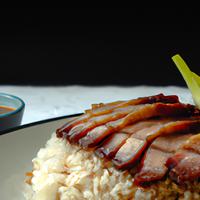
1 serving (300 grams) contains 600 calories, 25.0 grams of protein, 15.0 grams of fat, and 80.0 grams of carbohydrates.

Log this food in SnapCalorie

Nutrition Information
Calories |
472.4 | ||
|---|---|---|---|
% Daily Value* |
|||
| Total Fat | 11.8 g | 15% | |
| Saturated Fat | 3.9 g | 19% | |
| Polyunsaturated Fat | 0 g | ||
| Cholesterol | 39.4 mg | 13% | |
| Sodium | 944.9 mg | 41% | |
| Total Carbohydrates | 63.0 g | 22% | |
| Dietary Fiber | 1.6 g | 5% | |
| Sugars | 7.9 g | ||
| protein | 19.7 g | 39% | |
| Vitamin D | 0 mcg | 0% | |
| Calcium | 31.5 mg | 2% | |
| Iron | 1.6 mg | 8% | |
| Potassium | 236.2 mg | 5% | |
* Percent Daily Values are based on a 2,000 calorie diet. Your daily values may be higher or lower depending on your calorie needs.
Food Attributes
Source of Calories
About Charsiew rice
Charsiew rice is a popular dish originating from Cantonese cuisine, celebrated for its sweet and savory flavors. The centerpiece is charsiew, a type of roasted pork marinated in a blend of soy sauce, honey, hoisin sauce, and Chinese five-spice powder, giving it a caramelized glaze and tender texture. Served over steamed white rice, it often includes accompaniments like sautéed leafy greens or a drizzle of flavorful sauce to enhance the meal. While delicious, charsiew rice can be high in sugar, sodium, and fat due to the marinade and pork cut used, making portion control important. For a healthier version, leaner cuts of pork and reduced-sugar marinades can be substituted. Pairing the dish with generous servings of vegetables can boost fiber and nutrient content. This fusion of protein, grains, and greens offers a well-rounded yet indulgent meal enjoyed across generations.



